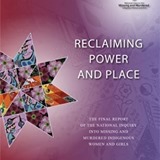 Dear readers, Thank you for persevering with me during this journey of love to read and understand the final report of the National Inquiry into MMIWG.
Dear readers, Thank you for persevering with me during this journey of love to read and understand the final report of the National Inquiry into MMIWG.
Chapter 8 has been intense, exploring Confronting Oppression ~Right to Justice from the perspectives of Pathways to Violence. We have reached the fourth and final pathway: Denying Agency and Expertise in Restoring Justice.
Denial of the agency and expertise of Indigenous women as protectors, advocates, and experts contributes to violations of their right to justice.
Taking Families Seriously (p.703): When an Indigenous women or girl goes missing, those closet to her are the experts. Family members “know” when something has gone wrong. This crucial information must be recognized as valuable and important.
Families carry additional emotional toll when police fail to cultivate a helpful relationship. When families and communities initiate and organize searches, they usually do so at their own cost. One recommendation was the need for financial support to families who are searching.
The Canadian Victims Bill of Rights, passed in 2015, affirms four principal rights: Information, Protection, Participation, and Restitution. Beyond this legislation, however, many family members identified the need to partner with Indigenous-led services to promote healing and better relationships with law enforcement.
One initiative is to create a police service that is reflective of the needs of the community. An example is a Counter Exploitation team who focus on relationship building with individuals engaged in the sex industry and who are at risk for trafficking.
(Personal Note: This is something Edmonton Alberta had in place for years with RCMP Project KARE and a network of referral agencies.)
International Human Rights Instruments and Principles of Justice (p.711): Access to justice represents a basic principle of the rule of law. In international human rights law, people have the right to be protected from violent crime. The right to justice includes provisions for what are called “effective remedies.”
In addition, Canada has the duty of due diligence, which is the responsibility “to take all appropriate measures to prevent, investigate, punish and compensate violence against women.” A number on international instruments exist to support many of the priorities that families and survivors identified.
Conclusion: Reinventing the Relationship (p.715): No amount of services, supports, or changes to policy can hope to restore justice if the change does not begin with relationships.
Findings: Right to Justice (p.717):
- The Canadian justice system is premised on settler-colonial society’s values, beliefs and laws; it fails to include Indigenous concepts of justice.
- The RCMP were used to implement and enforce laws designed to control, assimilate, or eliminate Indigenous Peoples. Examples include forced relocation of communities, removal of children to residential schools, prohibition of traditional spirituality and ceremonies, and enforcing the Indian Act.
- This historic role of the RCMP has not changed significantly.
- Continued racism and sexism, high rates of missing and murdered Indigenous women and girls, and lack of resolve have caused loss of trust in the Canadian justice system and police services in general.
- Language used in the Criminal Code and in criminal justice proceedings minimizes the severity of violent offences and serves to minimize the responsibility of the offender.
- The Canadian criminal justice system fails to provide justice for Indigenous people, especially missing and murdered women. This means violence against Indigenous women is met with impunity.
- Failure of the Canadian justice system to protect Indigenous women is well established and documented. Lack of effective response by the federal government prevents the fundamental paradigm shift that is imperative to end the genocide.
Victim Services Programs
- Victim services programs in Canada are inconsistently delivered across jurisdictions.
- Victim services programs are often designed to facilitate prosecution and conviction instead of justice, safety, security, and wellness needs of victims of violence.
- Victim services programs do not necessarily take into account the cultural and social realities of Metis, Inuit, and First Nations women and girls. Governments have an obligation to deliver victim services as a human right and to resource these services appropriately.
Legal Aid and Legal Instruments
- Legal aid systems and services are inadequate, inaccessible, and inconsistent. This continues to be a barrier for many women.
- Legal instruments designed to provide protection, such as protection orders, are underutilized and ineffective because of inadequate community resources and enforcement mechanisms.
Sentencing
- There is a commonly held belief that Indigenous offenders receive more lenient sentences because of Gladue principles.
- There is lack of research about the effectiveness of Gladue principles. In any event, sentencing is not creating safer communities or reducing the rates of violence again Indigenous women and girls.
- Incarceration of Indigenous women is increasing.
- Application of Gladue principles and reports are not consistent between jurisdictions.
- Glaude reports have not been considered a right and have not been accessible to women facing sentences.
- Gladue reports have limited value when alternatives to incarceration are not available in the community.
- The use of Gladue reports and principles are not adequately explained to families and survivors, leaving many families to believe less value is placed on their lives and the lives of their murdered loved ones.
- Many cases of murder by their intimate partner occurred in the context of ongoing and escalating violence and abuse. Criminal Code sentencing principles are not always consistent with Indigenous Peoples’ principles and values.
- Lack of transparency regarding plea negotiations and prosecutorial discretion contributes to Indigenous Peoples’ distrust of the justice system and a sense that Indigenous victims of crime are devalued.
AND SO ENDS VOLUME 1a. Another 200+ words in Volume 2b explore Healing Families, Communities, and Nations, three more chapters culminating in over 40 pages of Calls to Justice.

